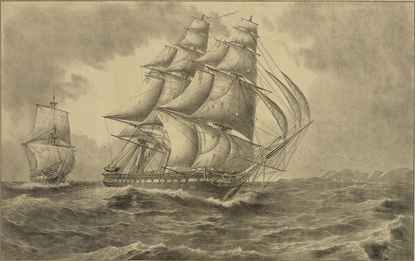One of the most unlikely celebrations of the War of 1812 was of American naval prowess. Few expected the small American Navy to have the success that it did in facing the well-trained Royal Navy, but this served posterity well. Especially as the United States emerged as a global power in the early 20th century, co-opted tales of the War of 1812 functioned easily to further political agendas.
I believe I shall not exaggerate when I say that a very large portion of the people of the United States are not aware of the fact that the war of 1812 constituted the coping stone of the edifice of American independence. Daughters of the War of 1812, during a 1900 convention

Library of Congress, Prints and Photographs Division
In the late 1800s, whether populist or elitist, the memory of the War of 1812 found new utility, expressed clearly at a meeting of the United States Daughters of 1812 in 1900. The orator of the day began with the requisite gesture to the American Revolution: “I believe I shall not exaggerate when I say that a very large portion of the people of the United States are not aware of the fact that the war of 1812 constituted the coping stone of the edifice of American independence.” But then he referenced more recent developments: “Those of us who have lately been thrilled with pride at the annihilation of the Spanish fleet on the morning of May 1, 1898, in Manila Bay, and by the destruction of the ships of Cervera off Santiago on July 3 of the same year, should bear in mind the fact that the supremacy of the American Navy was created by the war of 1812.”
In an age of rising imperialism, the US Navy would play a critical role, and the War of 1812 offered retroactively a pedigree, a set of heroes, and valued lessons. When the influential historian and naval theorist Alfred Thayer Mahan added two new volumes to his series on The Influence of Sea Power Upon History in 1905, Sea Power in Relation to the War of 1812, one reviewer asserted, “the war of 1812 was, as everyone knows, preeminently a naval war.” Helping to make such a claim “common knowledge” was Theodore Roosevelt, himself the author of The Naval War of 1812 (1882); numerous editions followed, and by 1886 it was, by regulation, required equipment on all US Navy vessels. Here and subsequently, as assistant secretary of the navy, vice president, and then president, Roosevelt argued strenuously for the creation and maintenance of a powerful navy; the United States had won on the sea in 1812, he claimed, and its navy would be critical to the country’s power in the coming century—a theme echoed throughout the centenary celebrations of the war, 1912–1915, and as the Great War erupted in Europe.
Part of a series of articles titled Legacies: The War of 1812 in American Memory .
Last updated: April 2, 2015
